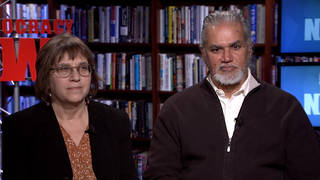HeadlinesJuly 14, 2014
U.N.: 80% of Gaza Casualties are Civilian; Thousands Displaced
Thousands of Gazans have fled their homes amidst a relentless Israeli bombing campaign that’s now killed more than 165 people, most of them civilians, since it began a week ago. The United Nations estimates more than 80 percent of the dead are civilian, of whom 20 percent are children — at least 36 dead. At least 1,200 Palestinians have been wounded, nearly two-thirds women and children. More than 940 homes have reportedly been severely damaged or destroyed, some 400,000 people are without electricity, and 17,000 people are displaced.
Israeli Leaflets to Gazans: “Any Moving Body Will Be Struck”
This weekend brought the deadliest airstrikes to date in Gaza, including a bombing that killed 18 members of the same family. Thousands of residents of northern Gaza have abandoned their homes to head south after the Israeli military warned them of impending attacks. One displaced resident described an Israeli leaflet telling locals: “Any moving body after noon will be struck.”
Bombings of Gaza Civilian Targets Include Center for Disabled
In addition to bombing homes, Israel has carried out a number of attacks on Gaza’s civilian infrastructure. The Palestinian Center for Human Rights says the targets have included “charities, parks, sport clubs, and a mosque.” On Saturday, two women were killed and four others were critically wounded when an Israeli missile struck a center for the disabled.
Medical worker: “These are the targets of [Israeli Prime Minister Benjamin] Netanyahu. These are remains of children. These are dolls for children. These are the targets of Bibi Netanyahu. These are the targets of the Jews. They are children in an organization for the disabled.”
The Israeli military says it fired a warning rocket to alert the center’s disabled residents of an impending bombing. But the center’s director told The New York Times that no one understood the warning, and that residents were “too handicapped to have fled the building on their own in any case.”
U.N. Rights Chief: Israeli Bombings of Gaza Likely Violate International Law
In a statement, the United Nations Office for the Coordination of Humanitarian Affairs said: “The scope of damage to civilian infrastructure in Gaza, particularly electricity, water and sanitation facilities and equipment, is of increasing concern.” A spokesperson for Navi Pillay, the U.N. high commissioner for human rights, said Israel’s attacks likely violate international law.
Ravina Shamdasani, OHCHR: “We have received deeply disturbing reports that many of the civilian casualties, including of children, occurred as a result of strikes on homes. Such reports raise doubts about whether the Israeli airstrikes have been in accordance with international humanitarian law and international human rights law.”
Hundreds of Rockets Fired on Israel from Gaza; Israeli Teen Critically Wounded
The United Nations has also voiced concern over ongoing indiscriminate rocket fire from militants in Gaza aimed at Israel. Hundreds of rockets have been fired so far, causing no direct killings. An Israeli teenager was critically wounded Sunday in a rocket attack on the town of Ashkelon.
U.N. Security Council Calls for Gaza Ceasefire
On Saturday, the United Nations Security Council passed a measure calling for a ceasefire, although with no timetable attached. The current Security Council president, Rwandan Ambassador Eugène-Richard Gasana, briefed reporters.
Eugène-Richard Gasana, U.N. Security Council president: “The Security Council members called for de-escalation of the situation, restoration of calm and restitution of November 2012 ceasefire. The Security Council members further called for respect for international humanitarian law, including the protection of civilians.”
Israeli Prime Minister Benjamin Netanyahu has ruled out a ceasefire, calling it “not even on the agenda.” On Sunday, Netanyahu said he does not know when the assault on Gaza will end, saying “it might take much more time.” Hamas has called for a ceasefire based on several conditions, including an end to the blockade of Gaza and the release of hundreds of Palestinian prisoners detained in the recent West Bank raids that helped spark the current violence.
Worldwide Protests Oppose Israeli Attack on Gaza
Protests against the attack on Gaza continue around the world. Over the weekend, tens of thousands rallied in countries including Argentina, Chile, Colombia, Canada, Germany, Britain, Scotland, Sweden, Norway, Australia, France, Syria, Pakistan, India and Japan. Here in the United States, rallies were held in cities including Detroit, San Francisco, Los Angeles, Chicago and Columbus.
Iraqi Lawmakers Delay Unity Talks; Violence Kills Dozens
Iraq continues to face nationwide violence amidst an ongoing impasse over forming a new unity government. Sunnis, Shiites and Kurds are all pushing different candidates for the key posts of prime minister, speaker of the parliament and president. The talks began this month but quickly broke down. A parliamentary meeting on Sunday was adjourned after just 30 minutes, with the next session scheduled for Tuesday. This comes as Sunni militants continue to carry out attacks as they expand their stronghold in the north and west of Iraq. On Sunday, militants led by the “Islamic State” group killed six people and seized government buildings in a town north of Baghdad. On Saturday, unidentified gunmen killed 26 people, including 20 women, in an attack on a building in Baghdad. The site had been linked to prostitution. The death toll from a suicide bombing in Kirkuk on Friday has reached 28.
Report: Pentagon Doubts Viability of U.S. “Advisory” Mission in Iraq
A newly disclosed report has revealed Pentagon concerns over its effort to advise the Iraqi military. According to The New York Times, U.S. military analysts have concluded that only half of Iraq’s military units “are capable enough for American commandos to advise them.” The assessment also concludes Iraqi units are so infiltrated by either Sunni militants or Iran-backed Shiites that U.S. advisers would face threats to their safety.
U.S. Brokers Deal to Audit Disputed Afghan Presidential Vote
The United States has brokered a deal to resolve a political crisis in Afghanistan over last month’s disputed presidential elections. Preliminary results show former World Bank official Ashraf Ghani beating opponent Abdullah Abdullah by about a million votes. Abdullah’s supporters have protested, calling the results a “coup” and claiming widespread fraud. After two days of talks, Secretary of State John Kerry appeared with both candidates to announce a full audit of all eight million votes.
Secretary of State John Kerry: “This is unquestionably a tense and difficult moment, but I am very pleased that the two candidates who stand here with me today and President Karzai have stepped up and shown a significant commitment to compromise. With respect to national unity, both candidates have agreed to abide by the results of the audit and that the winner of the election will serve as president and will immediately form a government of national unity.”
The agreement follows a power dispute that saw Abdullah threatening to form his own government. New figures from the U.N. show more than 1,500 civilians have been killed in Afghanistan this year, an increase of 17 percent.
Kerry Meets Iranian FM in Nuclear Talks
The United States and Iran are holding high-level talks today ahead of a deadline on a deal over Iran’s nuclear program. Secretary of State John Kerry has met with Iranian counterpart Mohammad Javad Zarif in Austria for the second consecutive day. Both sides say they remain at odds over several key issues, including Iran’s nuclear fuel-making capacity. Speaking to NBC News, Zarif reaffirmed Iran’s claim to a peaceful nuclear program and defended building underground facilities in light of repeated threats from the United States and Israel.
Mohammad Javad Zarif, Iranian foreign minister: “I will commit to everything and anything that would provide credible assurances for the international community that Iran is not seeking nuclear weapons, because we are not. We don’t see any benefit in Iran developing a nuclear weapon. When the United States talk about bombing Iranian facilities out of existence, what do you expect Iran to do? Iran would create a facility that is not susceptible to being bombed. That is what any rational country would do.”
GOP Lawmakers Seek Reduction of Border Funding Request; Deportations to Begin This Week
Congressional Republicans are vowing to trim President Obama’s $3.7 billion spending request for the migrant crisis on the southern border. The funding would be used to speed up deportations, as well as to improve care for thousands of children being held in detention centers, holding pens and temporary housing facilities. Republicans say they intend to make cuts when the House Appropriations Committee takes up the measure on Tuesday. Over the weekend, Senator John McCain of Arizona called for the mass deportation of migrant children caught at the border.
Sen. John McCain: “We have to move quickly to repatriate these children. The only way that this is going to stop is if planeloads of children arrive back in the countries in Central America that they came from and their parents see the $3-$4-$5-$6-7,000 that they have paid to the human traffickers is wasted. That’s the only way that this is going to stop.”
In a rare point of agreement with the White House, several Republicans have backed President Obama’s request for a waiver that would let the government deport children from Guatemala, Honduras and El Salvador as quickly as it does those from Mexico. A 2008 anti-trafficking law says children from countries that do not directly border the United States must be allowed to stay while their cases are processed. Many Democrats have opposed the waiver. On Friday, Democratic Rep. Luis Gutiérrez said the current crisis shouldn’t draw attention from the need for comprehensive immigration reform and an end to record deportations.
Rep. Luis Gutiérrez: “I want the president to be as bold and generous as Republicans have been petty and mean-spirited on immigration. We cannot let the current turmoil at the border — which we would be doing an even better job of controlling had this Congress addressed immigration reform — we can’t let this crisis distract us from the fact that record-breaking levels of deportation, and the threat of deportation, are taking a devastating toll on American communities throughout our nation.”
The Department of Homeland Security says it expects to begin deportations from the temporary detention facilities later this week.
Detroit Retirees, Public Workers Vote on Pension Cuts
Detroit creditors, including public workers and retirees, have submitted their final votes on the city’s plan to emerge from bankruptcy. The measure would cut pensions by up to 4.5 percent and scrap cost-of-living increases. Supporters have backed the plan on the grounds it would avoid even worse cuts down the line, while opponents urged a “no” vote by arguing pensioners are entitled to what they were promised. If approved, the plan would free up hundreds of millions of dollars in outside funding. Unofficial tallies show a majority of retirees and pensioners have voted in favor, but final results will not be known until next week. Detroit is currently facing a water crisis where the city has shut off service to thousands of households over unpaid bills of as little as two months.
World Council of Churches Divests from Fossil Fuels
The World Council of Churches has become one of the most high-profile groups so far to endorse divestment from fossil fuels. The Council’s Central Committee has endorsed a proposal that will phase out its holdings in all corporations profiting from carbon dioxide emissions. The World Council of Churches represents 300 churches with more than 590 million members in 150 countries. The group 350.org says the vote could mark “the most important commitment” on fossil fuel divestment so far, adding: “It opens the doors for churchgoers around the world to encourage their institutions to live up to their values and divest from companies that are destroying the planet and our future.”
Guantánamo Prisoners Seek Same Religious Protection as Hobby Lobby
Attorneys for Guantánamo Bay prisoners have argued their clients deserve the same religious protections recently granted to the corporate chain Hobby Lobby. In a ruling last month, the U.S. Supreme Court ruled most private companies that claim religious objections can refuse to provide birth control coverage to employees as required by Obamacare, citing a federal law protecting religious freedom. Appearing before the D.C. District Court last week, defense attorneys said their clients should be considered “persons” under U.S. law and should accordingly be entitled to the same protections as Hobby Lobby. Among several demands, the prisoners are challenging the denial of group prayer at Guantánamo. The Justice Department argued against the defense, saying the prisoners are “not persons” entitled to religious protections. Defense attorney Jon Eisenberg said: “It is truly grotesque for the Obama folks to insist that a for-profit corporation is a person, but a flesh-and-blood human being at Guantánamo Bay is not.”
Bergdahl Returning to Active Duty at Texas Base
The freed prisoner of war Bowe Bergdahl is returning to active duty. The Pentagon says that six weeks after his release by the Taliban, Bergdahl will take up a post at the Texas base where he has been receiving treatment. Bergdahl will also meet with investigators probing the circumstances surrounding his capture in Afghanistan.
Legendary Jazz Musician, Activist Charlie Haden Dies at 76
The legendary jazz bassist, composer and political activist Charlie Haden has died at the age of 76. In the late 1950s, Haden played in Ornette Coleman’s groundbreaking quartet, which changed the shape and sound of jazz. Over the years, Haden won countless music awards and played with many other jazz greats, including John Coltrane, Don Cherry and Archie Shepp. He also emerged as one of the jazz world’s most politically outspoken musicians. During the middle of the Vietnam War, he and Carla Bley formed the Liberation Music Orchestra. The group’s debut album mixed songs from the Spanish Civil War, antiwar songs and a tribute to Che Guevera. In 1971, he was jailed in Portugal for dedicating a song to the black liberation movements of Mozambique and Angola. In 2006 Haden re-formed the Liberation Music Orchestra in response to the Bush administration and the invasion of Iraq, titling his accompanying album “Not In Our Name.” In an interview with Democracy Now! that year, Haden discussed his life’s work.
Charlie Haden: “I’ve been so lucky to play with great musicians, most of whom I wanted to play with and I sought out when I was in my younger stages, and, you know, I wouldn’t do anything different, except I would seek out as many musicians to life the way I am and dedicated to beauty the way I am, because it’s not really about categories, like jazz, it’s about beautiful music and playing music from all over the world with other musicians who are dedicated, because it’s up to us to bring beauty back into this world. It’s up to people in the arts, the painters, the writers, the composers, the dance troupes, everybody, the actors, the people who write poetry. You know, it’s up to us to try to make a difference in this world and try to make this planet a better to live for all the human beings and stop the cruelty and the devastation that’s going on, you know, and have a great place.”
Most popular
- 1
- 2
- 3
- 4
Non-commercial news needs your support
Please do your part today.











Media Options